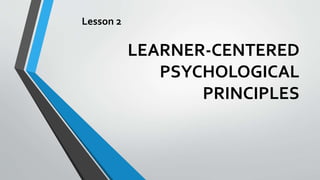
-MY PPT - LEARNER-CENTERED PSYCHOLOGICAL PRINCIPLES for upload.pptx
- 2. UNDERSTAND Expectations are; •Explain the learner-centered psychological principles and •Cite concrete learning situations to apply the different learner-centered psychological principles.
- 3. LEARNER-CENTERED PSYCHOLOGICAL PRINCIPLES -They focus on psychological factors that are primarily internal to and under the control of the learner rather than conditioned habits or physiological factors. -The LCP were put together by the American Psychological Association. The following 14 psychological principles pertain to the learner and the learning process. -The 14 principles are divided into four areas; • – Cognitive and metacognitive • – Motivational and affective • – Developmental and social • – Individual difference factors
- 4. COGNITIVE AND METACOGNITIVE FACTOR 1. Nature of Learning Process -the learning of complex subject matter is most effective when it is an international process of constructing meaning from information and experience. 2. Goals of the Learning Process -the successful learner, over time and with support and instructional guidance, can create meaningful, coherent representations of knowledge. 3. Construction of Knowledge -the successful learner can link new information with existing knowledge in meaningful ways. -Knowledge widens and deepens as students continue to build links between new information and experiences and their existing knowledge base.
- 5. 4. StrategicThinking -the successful learner can create and use a repertoire of thinking and reasoning strategies to achieve complex learning goals. -Successful learners use in their approach to learning reasoning, problem solving, and concept learning. 5.Thinking about thinking -Successful learners can reflect on how they think and learn, set reasonable learning or performances goals, select potentially appropriate learning strategies or methods, and monitor their progress towards these goals. 6. Context of Learning -Learning is influenced by environmental factors, including culture, technology and instructional practices.
- 6. MOTIVATIONAL AND AFFECTIVE FACTOR 7. Motivational and emotional influences on learning -the rich internal world of thoughts, beliefs, goals, and expectation for success or failure can enhance or interfere with the learner’s quality of thinking and information processing. 8. Intrinsic motivation to learn -Intrinsic motivation is stimulated by tasks of optimal novelty and difficulty, relevant to personal interests, and providing for personal choice and control. 9. Effects of motivation on effort -Effort is another major indicator of motivation to learn. The acquisition of complex knowledge and skills demands the investment of considerable learner energy and strategic effort, along with persistence over time.
- 7. DEVELOPMENTAL AND SOCIAL FACTOR 10. Developmental influences on learning learning is most effective when differential developmental within and across physical, intellectual, emotional, and social domains is taken into account. Individuals learn best when material is appropriate to their developmental level and is presented in an enjoyable and interesting way. 11. Social influences on learning Learning can be enhanced when the learner has an opportunity to interact and to collaborate with others on instructional tasks.
- 8. INDIVIDUAL DIFFERENCES FACTOR 12. Individual differences in learning -Individuals are born with and develop their own capabilities and talents. -Educators need to help students examine their learning preferences and expand or modify them, if necessary. 13. Learning and diversity -the same basic principles of learning, motivation, and effective instruction apply to all learners. 14. Standards and assessment -Assessment provides important information to both the learner and teacher at all stages of the learning process.
- 9. Alexander and Murphy gave a summary of the 14 principles and distilled them into five areas: 1.The knowledge base -One’s knowledge serves as the foundation of all future learning. 2. Strategic processing and control -Learners can develop skills to reflect and regulate their thoughts and behaviors in order to learn more effectively. 3. Motivation and affect -Factors such as intrinsic motivation, reasons for wanting to learn, personal goals and enjoyment of learning tasks all have a crucial role in the learning process.
- 10. 4. Development and Individual Differences Learning is a unique journey for each person because each learner has his own unique combination of genetic and environmental factors that influence him. 5. Situation or context Learning happens in the context of a society as well as within an individual.